Non-fiction
Non-fiction

Letterpress Revolution
While the stock image of the anarchist as a masked bomber or brick thrower prevails in the public eye, a more representative figure should be a printer at a printing press. In Letterpress Revolution, Kathy E. Ferguson explores the importance of printers, whose materials galvanized anarchist movements across the United States and Great Britain from the late nineteenth century to the 1940s. Ferguson shows how printers—whether working at presses in homes, offices, or community centers—arranged text, ink, images, graphic markers, and blank space within the architecture of the page. Printers' extensive correspondence with fellow anarchists and the radical ideas they published created dynamic and entangled networks that brought the decentralized anarchist movements together. Printers and presses did more than report on the movement; they were constitutive of it, and their vitality in anarchist communities helps explain anarchism’s remarkable persistence in the face of continuous harassment, arrest, assault, deportation, and exile. By inquiring into the political, material, and aesthetic practices of anarchist print culture, Ferguson points to possible methods for cultivating contemporary political resistance.

Selected Amazon Reviews
A book-length selection from Kevin Killian's legendary corpus of more than two thousand product reviews posted on Amazon.com.
An enchanting roll of duct tape. Love Actually on Blu-ray Disc. The Toaster Oven Cookbook, The Biography of Stevie Nicks, and an anthology of poets who died of AIDS. In this only book-length selection from his legendary corpus of more than two thousand product reviews posted on Amazon.com, sagacious shopper Kevin Killian holds forth on these household essentials and many, many, many others.
The beloved author of more than a dozen volumes of innovative poetry, fiction, drama, and scholarship, Killian was for decades a charismatic participant in San Francisco's New Narrative writing circle. From 2003–2019, he was also one of Amazon's most prolific reviewers, rising to rarefied “Top 100” and “Hall of Fame” status on the site. Alternately hilarious and heartfelt, Killian's commentaries consider an incredible variety of items, each review a literary escapade hidden in plain sight amongst the retailer's endless pages of user-generated content. Selected Amazon Reviews at last gathers an appropriately wide swath of this material between two covers, revealing the project to be a unified whole and always more than a lark.
Some for “verified purchases,” others for products enjoyed in theory, Killian's reviews draw on the influential strategies of New Narrative, his unrivaled fandom for both elevated and popular culture, and the fine art of fabulation. Many of them are ingeniously funny—flash-fictional riffs on the commodity as talismanic object, written by a cast of personas worthy of Pessoa. And many others are serious, even scholarly—earnest tributes to contemporaries, and to small-press books that may not have received attention elsewhere, offered with exemplary attention. All of Killian's reviews subvert the Amazon platform, queering it to his own play with language, identity, genre, critique.
Killian's prose is a consistent pleasure throughout Selected Amazon Reviews, brimming with wit, lyricism, and true affection. As the Hall of Famer himself reflected on this form-of-his-own-invention shortly before his untimely passing in 2019: “They're reviews of a sort, but they also seem like novels. They're poems. They're essays about life. I get a lot of my kinks out there, on Amazon.”
Introduction by Wayne Koestenbaum
Afterword by Dodie Bellamy

Loving Corrections
Ethical, pondering, and wondrous, adrienne maree brown’s Loving Corrections is a collection of love-based adjustments and reframes to grow our movements for liberation while navigating a society deeply fractured by greed, racism, and war. In this landmark book, brown invigorates her influential writing on belonging and accountability into the framework of “loving corrections”; a generative space where rehearsals for the revolution become the everyday norm in relating to one another.
Filled with practical wisdom on how to be a trustworthy communicator while providing bold visions for a shared future, Loving Corrections can speak to everyone caught in the crossroads of our political challenges and potential. No matter how new to the struggle, or how numerous our failures, brown’s indispensable writing is an invitation to us all. Includes an afterword by Janine de Novais.

Dances of Time and Tenderness
A cycle of stories linking queer memory, activism, death, and art in a transpoetic history of desire and touch.
Dances of Time and Tenderness is a bold, sensual cycle of transpoetic stories that blend memory and movement in an innovative choreo-text of rage, sweetness and sorrow. A dance hall where the dead and the living meet, the tales take us from the dungeons of 1990s San Francisco to the goldsmith’s forges of the earliest cities, tracing a transgenderational lineage of queer carnality. Not a memoir, but a collective memory, Julian Carter invites us to join artists and AIDS activists, sailors and skeletons, to fulfill the trans promise: “what we do with our bodies changes worlds.”

Islands of Kinship – A Collective Manual for Sustainable and Inclusive Art Institutions
Nikola Ludlová, Karina Kottová and 2 more
This comprehensive publication is the result of a two-year collaboration within the platform Islands of Kinship, which interconnects six mid-scale visual art institutions across diverse regions in Europe (Prague, Bratislava, Bitola/Skopje, Cologne, Helsinki, Riga). The project represents an innovative model of collaboration addressing issues of inclusion, kinship and togetherness, democratic exchange, and the ethics, emotions, and practical solutions needed for fair and sustainable institutional operations.
In this publication a unique group of curators, artists, and experts involved in their respective organizations as inclusion and sustainability coordinators reflect on social and environmental responsibility in artistic and institutional practice from theoretical, political, and practical perspectives. Through essays, mind maps, codes of conduct, and lists of principles and recommendations, they address issues such as accessibility, just representation, and participation. Apart from these contributions, the publication also features artistic projects that were presented in exhibitions and public programs in the framework of Islands of Kinship.
Texts by Ieva Astahovska, Jana Brsakoska, Veronika Čechová, Kris Dittel, Daniel Grúň, Michal Klodner, Eloïse Bonneviot & Anne de Boer, Jussi Koitela, Karina Kottová, Diana Lelonek, Nikola Ludlová, Aneta Rostkowska, Paulina Seyfried, Katarína Slezáková, Taka Taka, James Taylor-Foster, Fran Trento, Ivana Vaseva.

Steering The Craft
A Twenty-First-Century Guide to Sailing the Sea of Story.
With an introduction by Theo Downes-Le Guin, Karen Joy Fowler, Molly Gloss and Kelly Link.
Steering the Craft is Ursula K. Le Guin’s carrier bag of the tools of a writer’s craft: how – and why – to write. From the sound of language to tenses to point of view, Le Guin offers a comprehensive and generous guide to the fundamental components of narrative, illustrating her incisive analysis with examples from some of her favourite writers. Revised and updated for the twenty-first century, this handbook includes exercises that the writer can do alone or in a group.

The Letters of Audre Lorde and Pat Parker 1974-1989
Poets Audre Lorde and Pat Parker first met in 1969; they began exchanging letters regularly five years later. Over the next fifteen years, Lorde and Parker shared ideas, advice, and confidence through the mail. They sent each other handwritten and typewritten letters and postcards often with inserted items including articles, money, and videotapes.
The Letters of Audre Lorde and Pat Parker 1974-1989 gathers this unique correspondence in which Lorde and Parker discuss their work as writers as well as the intimate details of their lives, including periods when each lived with cancer. These letters are a rare opportunity to glimpse inside the minds and friendship of two great twentieth century poets.
Introduction by Mecca Jamilah Sullivan.

Hand That Touch This Fortune Will
Take my hand. Trace the lines on my palm with your fingers. What size and shape are they? Take note of their form: are they forked, tasselled, wavy, chained, broken? Now examine my fingers. Tell me my disposition; tell me what beholds me.
Mapping the hand as cosmos as clinic as history as biography, hand reading is a technique suspended between medical and mystical judgement, empirical diagnosis and speculative divination. This book weaves the lives and work of the ‘reader’ and the ‘read’ together in an intricate fabric. The central ‘reader’ is Charlotte Wolff (1897–1986), a friend of Walter Benjamin, Helen Grund, and Ernst Schoen, who after fleeing from Germany’s new regime in 1933, took up hand reading in Paris to make ends meet. The ‘read’ are anonymous acrobats, dancers, and department-store managers, and members of the avant-gardes of Paris and London, from Antonin Artaud to Romola Nijinsky, Marcel Duchamp to Virginia Woolf. Arranged as an index, this book is both a guide to the techniques of hand reading and a critical theory of its history and practice, mixed with Wolff’s later work as a theorist of gender and sexuality.
"Hand That Touch This Fortune Will is a study devoted to friendship, refracted through the portal of the upturned palm. Charlotte Wolff met the world by examining what was written on the hands of the times. What did she read in the landscapes of this intimate organ of touch, and what, through reading, was she fatally unable to see? Through a gentle fragmentation reminiscent of The Arcades Project, Dolbear acts as a thoughtful guide through fascinating and nearly forgotten passages in the European history of palmistry under late capitalism—along with all the political uncertainties and faggy gestures that formed its nimbus. With extraordinary attention to the peculiar experiments in living that have scarcely left a trace in the archive, Hand That Touch gathers the reader around those bars, clinics, and drawn curtains, where, under the shadow of fascist diagnosis, the occult comes palm to palm with the queer past." — M. Ty
Each book holds a very lovely insert of a hand reading chart, designed by Ana Cecilia Breña and Sam Dolbear. Printed on tracing paper, it allows the reader to read their hand as they read the book.
Sam Dolbear was a Fellow at the ICI Berlin Institute for Cultural Inquiry in Berlin from 2020 to 2024. His research addresses the life and work of Walter Benjamin and those around him. He has taught and published widely, including, with Esther Leslie, Dissonant Waves: Ernst Schoen and Experimental Sound in the 20th Century (2023). He is a co-founder of the sound and radio collective MayDay Radio.
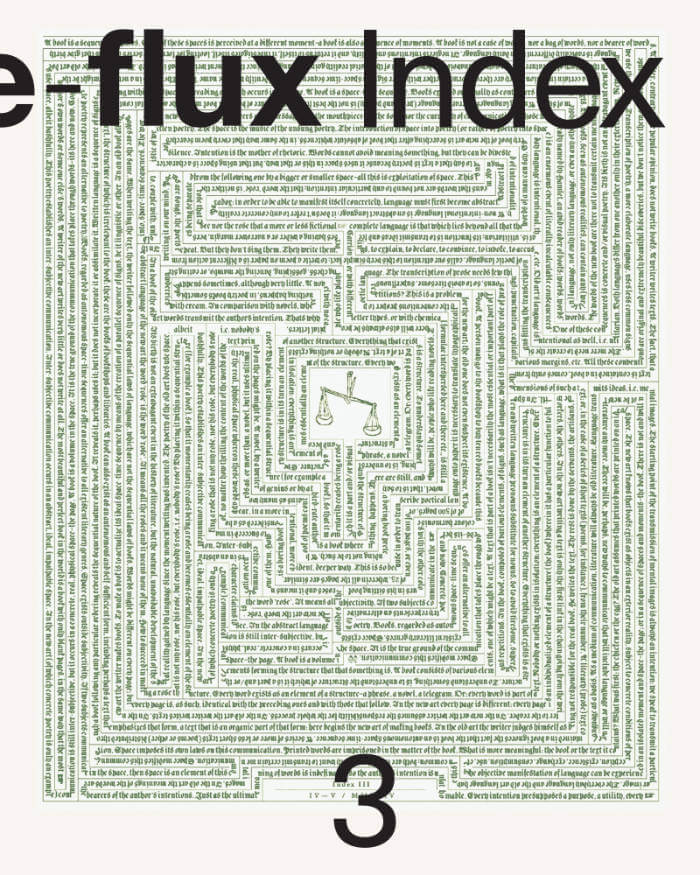
e-flux Index #03
76 contributions from an international selection of critics, artists, poets, architects, filmmakers, and theorists, published by e-flux between April–May 2024, arranged into 11 thematic chapters—ranging from the live question of cultural censorship through to the role of diagrams and notation in contemporary artistic practice.
540 pages long, this volume includes contributions from authors, artists, architects, filmmakers, poets, and theorists from many parts of the world. Ulises Carrión once declared that "In the new art every book requires a different reading"—an attitude which the Index here adopts in its approach to contemporary culture.
Contributions by Kwabena Appeaning Addo, Kimberly Alidio, Shouka Alizadeh, Corina L. Apostol, Aram, Arnavaz, Andrius Arutiunian, Robert Ashley, Goli Baharan, Stephanie Bailey, Oliver Basciano, Merve Bedir, Silvia Benedito, Pietro Bianchi, Alessandro Bosetti, Arno Brandlhuber, Nathan Brown, Boris Buden, Harry Burke, Rocio Calzado, Matevž Čelik, Adeline Chia, Ted Chiang, Canada Choate, Jace Clayton, Kim Cordóva, Ana Dana Beroš, Dasgoharan, Miri Davidson, Nuzhan Didartalab, Travis Diehl, Brian Dillon, Maria Dimitrova, Ben Eastham, Ren Ebel, Elaheh, Ludwig Engel, Future Foodscapes Research Unit, Ghoncheh Ghavami, Olaf Grawert, Boris Groys, Maddie Hampton, Negar Hatami, Jörg Heiser, Sandi Hilal, Daisy Hildyard, Juan José Santos, Nicole Kalms, Biljana Kašić, Tamta Khalvashi, Alina Kolar, Mo Michelsen Stochholm Krag, Cat Kron, Agnieszka Kurant, Michał Libera, R.H. Lossin, Rômulo Moraes, Daniel Muzyczuk, Nahal Nikan, Tausif Noor, Bahar Noorizadeh, Alice Notley, Joe Osae-Addo, Parva, Octave Perrault, Alessandro Petti, Andreas Petrossiants, Filipa Ramos, Jacques Rancière, Robida, Aoife Rosenmeyer, Mika Savela, Debora Silverman, Daniel Spaulding, Jonas Staal, Kerstin Stakemeier, Ben Vida, Anthony Vidler, McKenzie Wark, Katrina Wiberg, Kaelen Wilson-Goldie, Jenny Wu, Osman Can Yerebakan, Vivian Ziherl.

Understanding Molecular Typography
Molecular typography is the study of the chemical and physical underpinnings of letters. All characters are formed from seven basic atomic building blocks, known as typtoms. These typtoms come together in various combinations and configurations to form letters, numbers, and punctuation. Typtoms are not just theoretical tools for exploring the anatomy of type, but actual particles. Letters are molecules.
H.F. Henderson’s work, Understanding Molecular Typography, originally published in 1992, was a seminal work in the field. By condensing information pulled from nearly forty years of publications from the top molecular typographic scientists, Henderson made the science approachable to the everyday American for the first time. Part primer, part field guide, it lays out the basic principles, followed by detailed diagrams of the molecular formation of letters, numbers, and punctuation. A conclusion sums up the field of molecular typography to date, and a comprehensive bibliography provides valuable reference for the reader looking to learn more.
With the demise of the field of molecular typography as a whole in the mid-to-late ‘90s, (perhaps even due to its increased popularity brought on by Henderson’s work), Understanding Molecular Typography ran out of print, and has long since been forgotten. Peculiar as it may be, molecular typography is nevertheless a science worthy of being brought back to mainstream attention, if for no other reason than demonstrating humanity’s frequent scientific misconceptions throughout history. This reprint edition, with a new introduction by Woody Leslie, seeks to do just that.
"Until Henderson's incredible analysis, no one had created a conceptual framework sophisticated enough to do the analytic work in graphical physics that the alphabet required if it was to be fully understood. True, some of the Russian futurists, like Ilia Zdanevich, in their examinations of the properties of language, had begun to grasp the vague outlines of a modern scientific approach to molecular components, to the formation of compounds, and their behavior as chemical substances, within the structure of poetics. But Henderson's research was comprehensive and the results nothing short of astonishing." —Johanna Drucker

Issue Two: Becoming-ÊT/RE
Without intending it to be this way, Becoming’s magazine always appears when something big is changing for us. The first came at the very beginning, as a magazine published by our old record label, the second came just before we opened our Publishing House. Now, as we enter a new era, this magazine, the fruit of the Becoming Tree, is ripe enough to fall.
This issue is dedicated to the first-born of Becoming, a record label named Eternal/Return. We are using ÊT/RE to return to our centre, Music. Yet, we have a specific take on music that we wish to dedicate ÊT/RE to: we want to view music as a matter of world- building, of utterance, invocation— music is the second fire of Prometheus, we must carry it into the dark as we would a flame. Music is arcane; it is a ritual of summoning, of calling a forth a future—it is with sound that we create new spacetimes, and with music we create new worlds. It is hard to talk about music without talking about everything else. So that's what we did.
Featuring Charles Mudede, Female Wizard, Mystiki Fleva, Rose Laurel, Ibrahim Alfa Jnr, IOLI, Palais Sinclaire & 0nty

Christian Eschatology of Artificial Intelligence: Pastoral Technologies of Cybernetic Flesh
The book tracks the overlap of various “regimes of truth” from the Greco- Roman period through to the AI and cybernetic period, in order to present a continuity that ties together Christian Pastoralism and Neoliberal Self-Governance. The result is a fascinating and detailed examination of western hegemonial doctrines and signs, such as the Logos, the Flesh, and the Fall.
Vachnadze leaves us with no conclusion besides a certain feeling in our stomachs, a feeling that often comes when someone makes you aware of something fascinating, but deeply unnerving. The author weaves scripture and theory together in a way which can be as exciting as conspiratorial fictions, but it is executed without compromising the respectable position he has established at the point where non meets sense.

Semiotics of the End: Essays on Capitalism and the Apocalypse
The apocalypse as such will not take place, as it is already finished. Today, there is no longer any difference between the end of the world and capitalism itself: from Britney Spears’ Till the World Ends to The Caretaker’s Everywhere at the End of Time, from Avenger’s Endgame to Donnie Darko, and all the way down to the internet’s Backrooms, the world never ends but is reproduced again and again according to the semio-logic of capital.
In contrast with Mark Fisher’s Capitalist Realism, Semiotics of the End is a manifesto for the imagination of another relationship with the end. If it is easier to imagine the end of the world than the end of capitalism, as Slavoj Žižek, Fredric Jameson, and Mark Fisher put it, it is only because we have not imagined anything yet. The end is just the beginning.
With an Afterword by Matt Bluemink
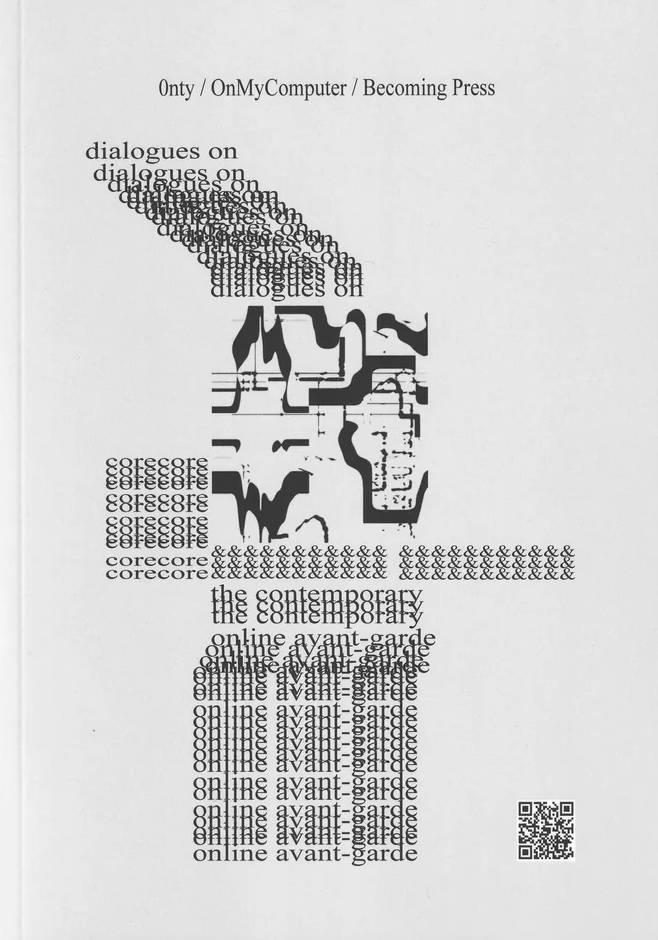
Dialogues on CoreCore & the Contemporary Online Avant-Garde
Featuring contributions from various artists and authors, including Louis Morelle, Persis Bekkering & Crisis Acting.
Dialogues on CoreCore & the Contemporary Online Avant-Garde gathers the work of over forty artists, writers, and philosophers to address the trajectories of the underground avant-garde digital art-world. A variety of topics and visual styles are represented in this anthology, but particular attention is paid to CoreCore, the DIY experimental filmmaking meta-trend which emerged on TikTok in the dusk of 2020. In part an anthology of critical and experimental essays, in part a curatorial artbook, in part a volume of conference proceedings, this text invites the viewer to explore the grassroots conference of a particular cybercultural moment.
This book follows on from the proceedings of All Things are Nothing to Us, a symposium on CoreCore and the Contemporary Online Avant-Garde, held on December 2nd. 2023, at the School of Visual Arts, NYC; organized by 0nty and OnMyComputer (Dylan Smith).
FEATURES WORK FROM:
0nty - Dylan Smith (OnMyComputer) - John-Robin Bold - Bebe_Crotte - Societyiftextwall - Aemmonia - Emonie Fay Chetwin (Xleepyfay) - Alice Aster - Anastasija Pavić - Anastasiia Pishchanska (shelestvetrovki) - Ash Ingram - ChaoticRhizomatic - Crisis Acting - Dana Dawud - Daniel Neeman - Edson Javier Rogil - Hunter Thompson - Joe Iovino (Levels of Nuance) - John DeSousa - John Michael - Jomel - Liam Harding (X._.pulp) - Louis Higgins - Louis Morelle - Maria Puglisi - Mason Noel - Mischa Dols - i0 xen0 - Nicholas Sanchez (Wonderful Cringe) - Nick Vyssotsky - Nikolaos Sakkadakis - Orion Arnold - Persis Bekkering - Redacted Cut - Reed McDonaldson - Rokas Vaičiulis - Rozzlyn Agnes K - Soham Adhikari - Uba - Zoey Solomon - Machine Yearning - Jordi Viader Guerrero - Tommaso Campagna - Kali Masoch

In the Delirium of the Simulation: Baudrillard Revisited
15 years after his death, the ghost of Jean Baudrillard lingers. Beyond just a pessimistic media theorist, the hyper-realist metaphysician of media and information may have become more relevant than ever before, and many of the concepts that Baudrillard left behind have become guiding principles in an ever deteriorating situation. Much of these ideas, from the Hyperreal to Cultural Nihilism, were repopularised in the last 15 years through such books as Capitalist Realism, in which the poster child for critical theory, Mark Fisher, appeared to have left the world a message, written in blood on the inside of our shared prison cell: Baudrillard was right all along!
This book is a serious diagnosis of the current form of capital, a profound excavation and presentation of the most important and helpful ideas that Baudrillard published from the unravelling of western philosophy, to a redefining of marxist theories of economics and capital, to a shift in critical theory that complies with quantum theory.
Published in collaboration with NON (Frankfurt)
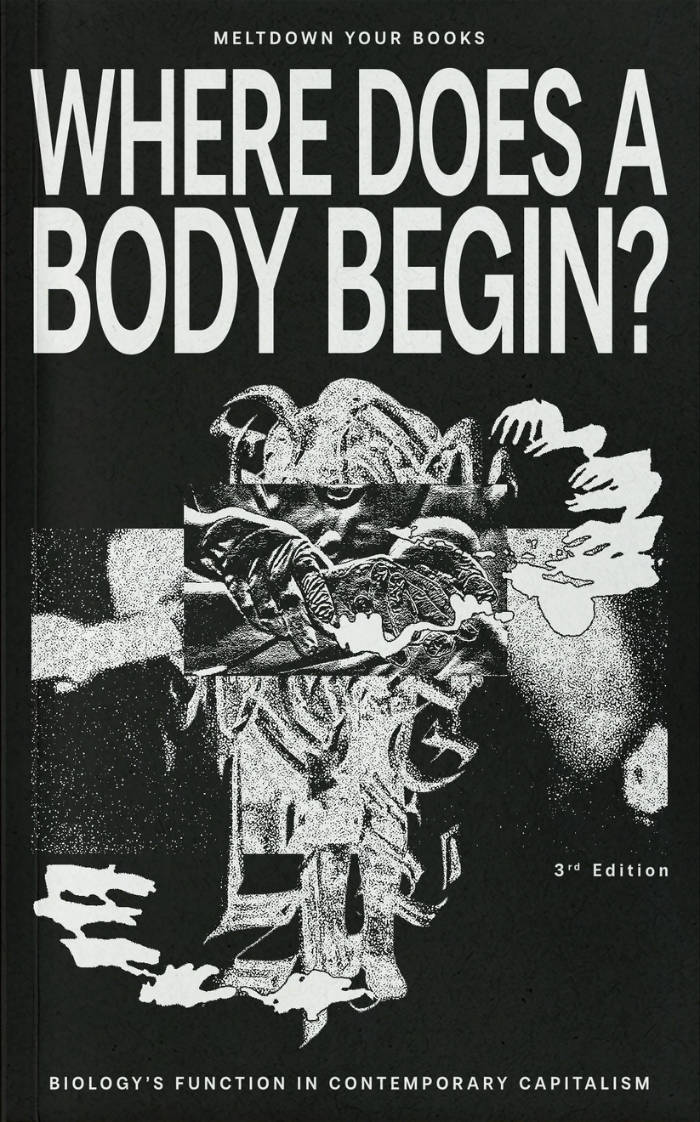
Where does a Body begin? Biology's function in contemporary capitalism
While presented as a contiguous work, the book is formed of different essays that have been dissected, recomposed with artificial connective tissue. The result lies somewhere between the rhizomatic continuity of a Body-without-Organs, and the disjointed assemblage of roadkill; either way, the question of where to even begin remains the same.
These essays each grow out of a particular resentment that developed through years of experience as a working-student of biology, but the task of the book was to transform this into something productive, something that sticks granular propositions into Biology like acupuncture needles. Inherent sexism within Biological research is, after all, not entirely disconnected to Pharmaceutical giants flooding the streets with opiates—and it is simply a writer’s hope that some well positioned words can remind enough people of how its all connected.
In what could be perceived as a philosophical turn, the importance of talking about science, as much as doing it, is re-entering the popular scientific consciousness, and it is high time, too. What was already getting bad under Biden, became catastrophic under Trump, and the infiltration into public research by private institutions and capitalist enterprises, which this book highlights, is proving dire. The capitalisation of all things bio, whether -yoghurt, -metric data or -logical institutions, is necrotic—MeltdownYourBooks didn’t flinch, they just grabbed the scalpel, dowsed the flesh in ethanol, and asked the question we all forget needs answering: where first, Doc?
Meltdown Your Books (M.Y.B.), the pen name, was made as a portmanteau of the seminal essay Meltdown by Nick Land, and the landmark film Throw Away Your Books, Rally in the Streets by Shuji Terayama. I chose the name, almost 3 years ago now, to reflect the political and digital black hole I saw hovering at the edge of contemporary media experience, and to present my work without the muddy veneer of personal identity. It has remained, since its inception, an anonymous project in only the loosest terms. The dedicated could always find my real identity, and some have, and so its anonymous character existed primarily as an element of presentation. Its anonymity existed to emphasize its deindividuated character. The things I discuss and emphasize under the M.Y.B. label are not items with definitive characteristics, they are collective experiences. M.Y.B. is something I cherish beyond self.

Affects & Dreams: a manual for Becoming
Affects & Dreams: a manual for Becoming, the first book authored by niko mas, is a relatively quick dive into the waters of Becoming; a schizo-guide to our publishing practice (why, how, and for what cause do we publish/transmit). We tell the story of a radio show that bridged our project Crossdressing Diogenes with our latest project, Becoming. In telling the story of how we arrived here at all, we have a chance to index all of the fields and domains that Becoming has entered into so far, and begins to maniacally draw lines through many subjects.
Some of the topics covered here include:
Images of Thought, Listening modes, Negativity and The Ear, Minimalism, Honest Electronics, Logocentrism, Metaphysics of Presence, Natural
Physics, Lumbung Radio, Rave Culture, Tripping, Radio Control Rooms, Analogical Transmissions, Anamorphoses, Insomniac Dream-Machines.

Technically Man Dwells upon this Earth
A brilliant and creative account of Thinking that cuts through the noise eminating from Artificial Intelligence and Art. In one fatal blow, the author makes the case that while Artificial Intelligence cannot make art, the majority of art that is produced today and throughout history is no different to what an Artificial Intelligence can produce. AI is therefore both an end to Art and its chance to begin again.
“The artist is cancelled: this is the time of art.”
With a Foreword by Louis Morelle.

Incubation: a space for monsters
New edition of this long out of-print classic of diasporic literature, featuring a forward by Eunsong Kim, an afterword by Emgee Dufresne, and new endnotes by Bhanu Kapil.
Incubation: a space for monsters is a formally innovative, hybrid-genre book that incorporates poetry and prose. Set in a shifting narrative environment, where human bodies, characters, and text are neither one thing nor another, this fragmentary-diaristic text journeys through the spaces in-between. Originally published in America in 2006 by Leon Works, and out of print for the last seven years, this is the first time this seminal text has been available in the UK.
Following protagonist Laloo – Cyborg, girl, mother, child, immigrant, settler – on a roadtrip through American landscapes, genre styles, and form, Incubation creates radical space for what is ‘monstrous’. Appropriating iconic American tropes, and the structure of Jack Kerouac’s On the Road, Incubation explores the challenges faced by immigrants in attaining such notions of freedom in so hostile an environment. In this fragmentary document there is a celebration in the cobbling together of lives; global in scope, with an intimate focus on interior voice, this landmark text evidences the early innovations and talents of this T.S. Eliot prizewinning author.

Juggling (Practices)
In Juggling , Stewart Lawrence Sinclair explores the four-thousand-year history and practice of juggling as seen through his life as a juggler. Sinclair—who learned to juggle as a child and paid his way through college by busking—shares his experiences of taking up juggling after an episode of suicidal ideation, his time juggling on the streets, and ultimately finding comfort in juggling during the COVID-19 pandemic. In many ways, this is a book about loss and recovery. From his own juggling story to clowns braving military checkpoints in Bosnia and Rwanda to perform in refugee camps to contemporary avant-garde performances, Sinclair shows how the universal language of juggling provides joy as well as a respite from difficulties during hard times.

Art as Experience
Based on John Dewey's lectures on esthetics, delivered as the first William James Lecturer at Harvard in 1932, Art as Experience has grown to be considered internationally as the most distinguished work ever written by an American on the formal structure and characteristic effects of all the arts: architecture, sculpture, painting, music, and literature.

How Are Artists Chosen? Exclusivity, precarious work and asymmetries in Art Competitions
Ramaya Tegegne, Tiphanie Blanc
The third volume of a new series of publications by the collective Wages For Wages Against, acting for better work conditions in the visual arts and against all forms of discrimination.
In 2022, the collective Wages for Wages Against applied for the Swiss Art Awards with the ambition of questioning the very model of the prize and its impact on artists. Art competitions are presented as real opportunities for artists, and arise throughout their careers, starting with school—entrance selection procedure, juried evaluations, diplomas and honors distinctions—, all the way to professional recognition—Meret Oppenheim Prize, Marcel Duchamp Prize, Turner Prize, etc. Only a handful of artists are selected for merit-based reward. However, this logic of sorting and validation upholds an entire system that reproduces inequalities and that perpetuates precarity in a milieu that is exclusive, and thus excludes. The institutional practices of communication and selection, as well as the validation of unpaid labor, favor certain artists at the expense of others. In this context, we surveyed the artists who participated, are considering participating, or are not participating in the Swiss Art Awards competition, in the interest of understanding their experiences and sharing their demands. In a broader sense, we wish to rethink the founding principles of artists' support policies and work to build a less competitive art world.
Wages For Wages Against (WFWA, wfwa.ch) is a a militant collective and a campaign for the fair remuneration of artists in Switzerland, better work conditions, and an alternative economy of the arts.
Contributions by Nathalie Stirnimann & Stefan Stojanovic and Amandine Gay.
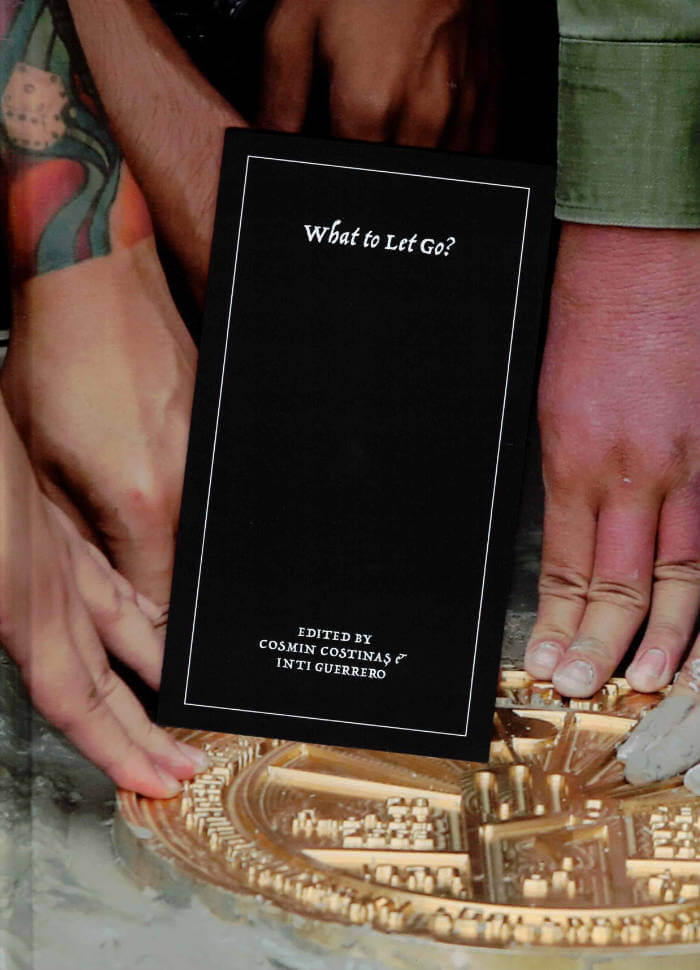
What to let go?
Cosmin Costinaş, Inti Guerrero
What gets counted within the category of heritage, and who gets to do the counting?
This book contributes to discussions about what counts as heritage now, who gets to do the counting, and broader related issues around the subject of cultural sovereignty. It unpacks historical narratives and political memories linked with objects, sites, and ceremonies that have been lost, looted, restituted, repatriated, revived, or reinvented. Through its diverse line-up of discourse, poetry, and original artistic contributions, it weaves together subjects and geographies that are not usually part of the same conversation —from plundered cultural belongings held in colonial collections, to processes of renaming or removing symbols of past eras— and considers how they relate in the context of recent social upheavals and political processes across continents.
In our era of dangerous revisionism, when history has become a battlefield for both the left and the right, we are asking: How can art reconfigure our collective foundational myths? And of what should we let go on the journey towards figuring it out?
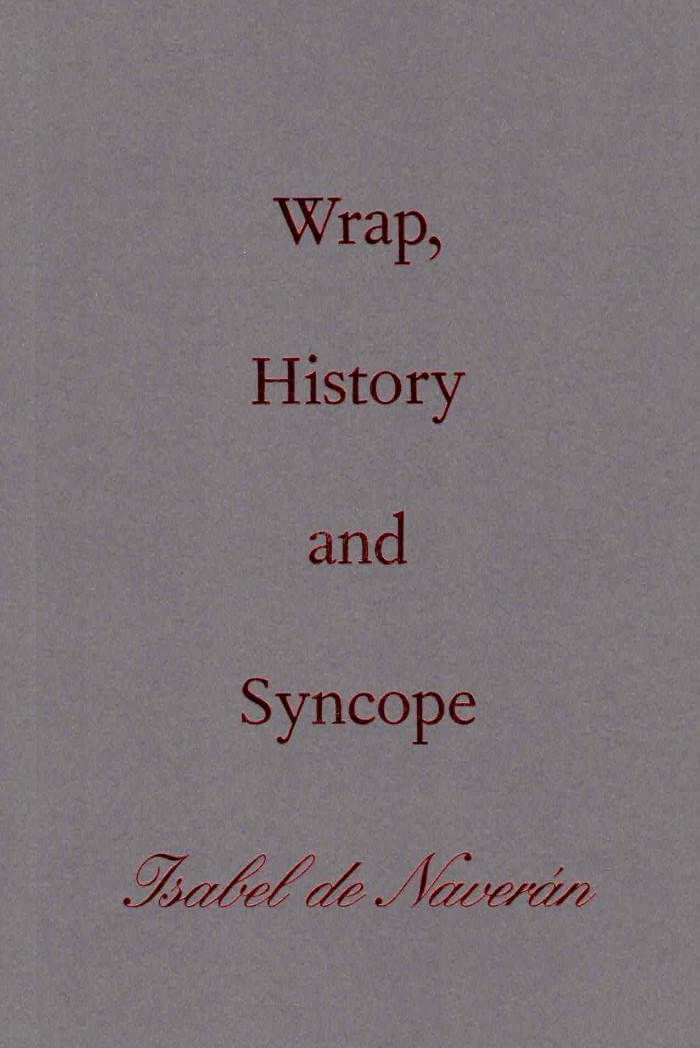
Wrap, History and Syncope
18 July 1936, Bayonne. After hearing the news of the Fascist uprising, the Spanish dancer and bailaora Antonia Mercé y Luque, known as La Argentina, suffers a syncope and dies in fateful synchrony with the Second Republic. History, and the artist’s body, have been seized and broken by the event.
In close dialogue with images and historical documents, Isabel de Naverán pursues the reverberations of that shock and how it resonates with collective pain and artistic translations (by Federico García Lorca, Gertrude Stein, Kazuo Ohno and others). How does history affect and move through bodies? How do living bodies carry and pass on cultural legacy and collective memory? What do these complex movements reveal about the present? Wrap, History and Syncope is an affective journey that invites the reader into tracing and revisiting other bodies, to ultimately dance their difference and multiplicity for oneself.
Isabel de Naverán is a writer and researcher. Concern with the passage and use of time is the backbone of her work, which focuses on bodily transmission and the examination of the concept of historical time by way of ephemeral and fugitive practices. She holds a PhD in art from the University of the Basque Country.
Translation from Spanish: Toni Crabb
Graphic design: Michaël Bussaer